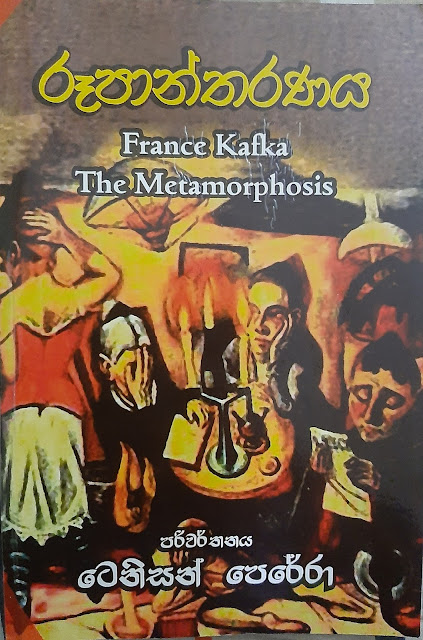Franz Kafka (1883 - 1924) or Tennyson Perera ( 1940 - Present ) are not writer's of my generation. But after watching "Swaroopa" (ස්වරූප) (2014), a film based on the novella "Metamorphosis" (1913) by the great Dharmasena Pathiraja, (1943 - 2018) the shock, and the attraction lead me to read the English and Sinhala translations of the same book.
Due to the immense service rendered to Sinhalese literature by Tennyson Perera by writing a large sum of books he is famous even in the present.
This Sinhala translation was made referring to Stanley Corngold's (1934 - Present) English translation.
When reading the English and Sinhalese translations it is evident that Tennyson Perera reflects surrealism in a different view than Franz Kafka.
"Kafka-Time" is an emphasis done by the English translator of "Metamorphosis", Michael Hoffman (1957 - Present) that I read about Kafka's writing style. Under this emphasis, the translator explains that the time spent in a moment of a story elaborating an event that took place in the stories differs from one place in the story to another, in the writing style. This is sometimes very attractive as well as sometimes a tiring experience to the reader. Considering the period Kafka lived and did his work as a writer these contributions to global literature are a great deal though I'm not a specialist or an expert in literature.
These aspects have been well identified by Tennyson Perera creating a piece of evidence or a mark that two writers of two generations and two nations have understood the objectives of each other. This is very valuable for readers.
Kafkaesque pain and cruelty are very creative beyond imagination. In these observations, the surreal nature of human perspective after the industrial revolution in the western world is materialized by the writer in his imagination. By adding the kind-hearted cultured perception of the eastern world in the back cover of the Sinhalese translation, Tennyson Perera has shown the clash of cultures in the eastern and western worlds. But considering the sad and bad state, our country is in the past seventy years after independence from the British it is evident that it is just as a cultural camouflage.
Though reading Kafka was a very tiring experience it unveiled me to a complex literature process and an enjoyable read.
Overall rating - 3/5


No comments:
Post a Comment